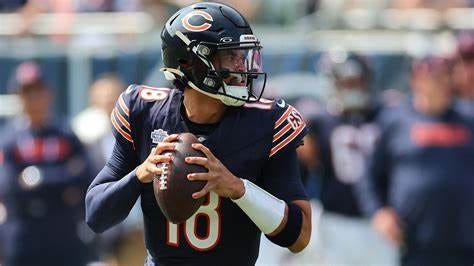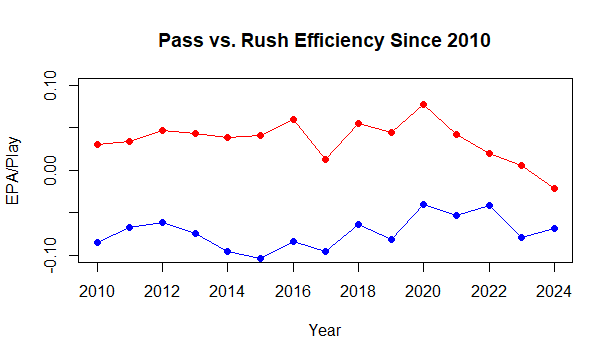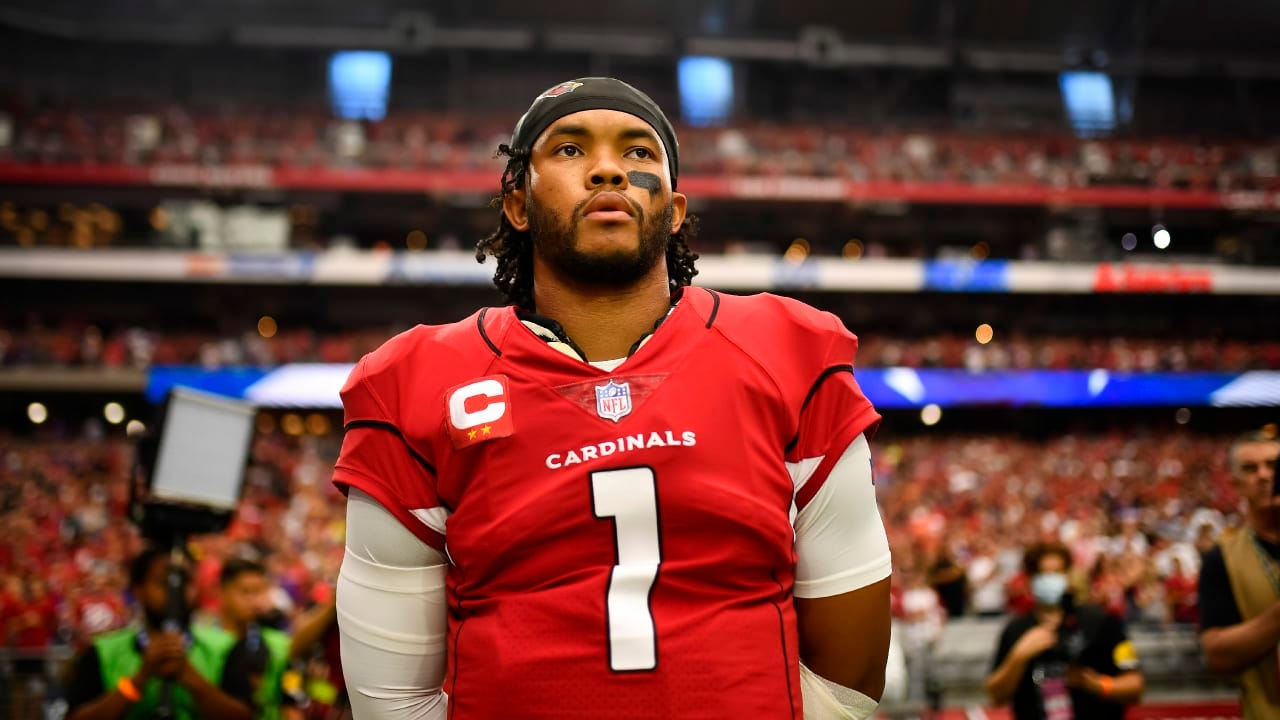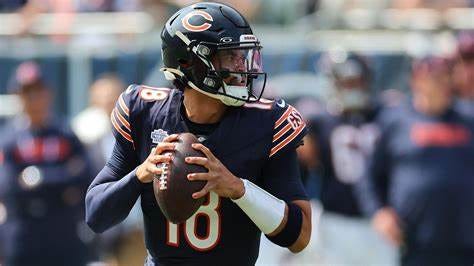All These Unqualified Quarterbacks are Hurting the NFL
The reason for the down offence in the NFL is simpler than you think. Teams keep using bad Quarterbacks.
Welcome back to my Sports Passion Project, where I must admit something.
I’m a liar.
I’m a dirty filthy liar, because in my last post about the worst play in NFL history, I said that I wasn’t going to write about week one unless something interesting happened. Nothing interesting did happen, but here I am writing about week one anyway.
I’m never on NFL Twitter. Ever. I tend to prefer NFL Substack much more. However, in my quest to see if Amelia Probst was going to going to update her excellent Rushing Yards Over Expected app for 2024 (negative. Sad face), I had to brave the dreaded bird website, and in the NFL Twitter communities I’m in, this graph (and others exactly like it) were making the rounds:
The key point to this graph is that passing has been more efficient than rushing since the dawn of time in the NFL, justifying stats guys like me to scream that teams ought to pass more and run less. By and large, over the years this has come to pass, with the NFL in 2023 featuring 21819 pass plays, compared to just 13781 runs. That means out of the 35600 offensive plays run in the 2023 NFL season (playoffs included. All figures in this piece include playoffs), 61.3 percent were pass plays.
Notice how I said pass plays. I did not say passes. This is because of one key disconnect that even the smartest of NFL stats people struggle to grasp sometimes.
Scrambles are pass plays.
I know it’s unintuitive to think of a play as a pass play unless it ends with a pass attempt, but there’s no doubt that as a QB, analysing pass rushers while keeping eyes downfield, and spotting rushing lanes to run through while not taking your eyes off your receivers is a passing skill. It is not a rushing skill. This is why despite being clearly a much more physically skilled runner with the football, Justin Fields generated -0.08 EPA/Rush in 2023, compared to Josh Allen’s (a below average ball carrier) 0.45.
The best rushing QB in the NFL is Josh Allen. In 2022 he lead the league in EPA/Rush and in YAR. In 2023 it was just EPA/Rush, but the point is that this can be true at the same time as him being below average as a ball carrier, because rushing as a QB is actually a passing skill. That’s why Justin Fields isn’t very good at it, despite the fancy highlights that say otherwise.
Most of the graphs that were popping up on Twitter had QB scrambles (the most productive NFL play that does not end with a pass attempt) included in the ‘run’ part of the line graph, which instantly lost them all credibility with me, because these were called pass plays in the huddle. It makes no sense to have them included as runs in the data, even if they ended as rush attempts.
I decided to include the graph above, because it at least had the decency to exclude QB scrambles altogether, which is more productive than including them as rushes, but still doesn’t hit the point that QB scrambles are pass plays. I looked all over the internet looking for a graph that included scrambles as passes, without any luck, which means I had to make one myself. I used the same colours, but forgive me. My graph making skills are a little weak:
This is the real difference between called passes and called runs. It’s clear to see that calling a pass play (however it may end) is still much more productive in terms of scoring points than calling a run play. Rush efficiency is much closer to pass efficiency that it used to be, but still isn’t particularly close, with runs (excluding QB scrambles) in week one of 2024 generating -0.068 EPA/Play, compared to passes generating -0.021.
Offence was down in week one, meaning that calling either a run or a pass was (on average) going to make a team less likely to score, but rush plays were still a lot worse. This means that offence in the NFL is still driven by the pass, regardless of what people on NFL Twitter may tell you, which gets me to the crux of what I want to talk about here.
Why are teams so consistently sacrificing the very most important aspect of the game of football, which is the pass offence?
You may not like my use of the word ‘sacrifice,’ because that implies that teams are electing to have really bad pass offences on purpose, and that just seems counterintuitive. However, I do like my choice of words, and I’m going to explain why.
I’m going to invent a standard right now of when it’s predictable that a QB is going to play very badly. There will be two ways to get onto my list of ‘predictably terrible’ QBs. The first is to be a rookie. Not a first year starter (like Patrick Mahomes in 2018), but a true rookie (like Josh Rosen in 2018). Fans may get hyped about their rookie QB prospects, but the fact of the matter is they are worse than veterans, virtually always.
To give you an example of just how often rookies play below standard in their rookie season, I looked through every QB in every NFL season all the way back to 1981. There have been 583 QBs drafted into the NFL since 1981. Of those, (counting the supplemental draft) 119 have been selected in the first round.
Remember those numbers, 583 and 119, as I tell you that since 1981 there are nine QBs who started as true rookies and played so well that I doubt any veteran could’ve played better: Dan Marino in 1983; Peyton Manning in 1998; Ben Roethlisberger in 2004; Matt Ryan in 2008; Cam Newton in 2011; Robert Griffin III and Russell Wilson in 2012; Dak Prescott in 2016; Mac Jones in 2021, and if you want you can throw 2020 Justin Herbert and 2023 CJ Stroud in here (who were both carried by supreme offensive supporting casts to okay results), but I don’t.
That’s nine (maybe 11) out of 583 QBs drafted since 1981, and out of 119 drafted in the first round. If we restrict it strictly to the first rounders, that’s seven out of 119 that come into the league and truly played well as rookies, about six percent. That’s why when I’m looking around the league, I simply expect pass offences lead by rookie QBs to be really bad.
The other criteria is much simpler and requires much less explanation. Over the last two years, if your CPOE is less than -1 (which I’m using as an arbitrary barrier to mean quite far below average) I’m not going to predict any success for you. This is simple. Why would you predict success for somebody who has consistently demonstrated poor throw accuracy (the stat that tends to persist the most)? There are some mitigating circumstances, but not many.
There we have it. The two criteria a player must meet for me to predict them to play badly are either to be a rookie, or to have exhibited poor throw accuracy for a long time. For the first week of the 2024 season, there were a whopping 10 of the 32 starting QBs that failed one of these two criteria. However, I will exclude two of them.
The first exclusion is Baker Mayfield, who fails the throw accuracy criteria due to his 2022 being the worst QB season out of a non-rookie since the invention of the CPOE statistic in 2006, which heavily biases his two-season average. I’m willing to overlook it in favour of his 2023 bounce back. The second exclusion is Matthew Stafford, who unlike Baker fails this criteria due to not being very good in either of the last two seasons in terms of throw accuracy. However, it just feels silly to put the QB of a McVay offence into the ‘predictably bad’ category, so he gets off the hook.
That leaves us with eight out of the 32 starting QBs for week one who I would’ve predicted to perform quite badly, strictly based on who they are. No opponent adjusting or anything like that. In no particular order, there eight are: Caleb Williams, Bo Nix, Jayden Daniels, Anthony Richardson, Bryce Young, Kyler Murray, Deshaun Watson, and Gardner Minshew.
You can see from this list that these are not especially stringent criteria. People like Sam Darnold, Jacoby Brissett, Daniel Jones, Justin Fields, Kirk Cousins, and Will Levis all get missed by them, so it’s not like I’m swiping some merely below average players here. There are just eight people (out of only 32 jobs that are available) who are truly bottom of the barrel, in my opinion.
If we look exclusively at the play of the eight people on this list, in week one they got to play against the 30th, 28th, 24th, 17th, 15th, 11th, 5th, and 4th ranked defences from last year. Not the easiest week I’ve ever seen, but likely easier than average, and against this light competition, they combined to generate -43.06 total EPA in their combined 338 plays of action, for -0.127 EPA/Play.
That’s horrendous, and if not for Kyler Murray having a legitimately good game against the Buffalo Bills (a pattern I don’t think will continue), this could’ve looked a lot worse for the group of eight.
Keep in mind that I did not simply pick out some bad performances. Anybody can do that. I picked out eight predictably bad performances. I could not have predicted that Dak Prescott, Daniel Jones, Will Levis, and Joe Burrow were all going to play as badly as they did. Therefore, they’re not included here, but for the group of eight above, they don’t get the same luxury.
You may ask: if these QBs were always going to play quite badly, why are they starting?
Good question.
A lot of these galling choices come from the misguided belief that forcing a rookie QB to endure a miserable season on the field will help with their development. Trust me. Coaches and fellow players do not believe that these rookie QBs are actually the best they can field. Only a fool (or a fan) would believe that, but what a lot of them do believe is that a rookie QB going through a really bad rookie season somehow helps them get better in the future, an assertion there is absolutely zero evidence for.
To prove that, I’m going to use the top ten QBs of my 2023 QB rankings, and look at their paths in their rookie seasons.
Of this ten QB sample, two sat their whole rookie seasons (Jordan Love and Patrick Mahomes). Two got some show-me reps on teams that were already long dead (Jalen Hurts and Jared Goff). One (Tua Tagovailoa) was made starter midseason as a rookie to ensure that a playoff calibre team would not make the playoffs, as the owner was intent on the tank not being over yet (a situation there's since been lawsuits over). Three were meant to sit through their rookie years, but had to come in for injury reasons (Brock Purdy, Lamar Jackson and Baker Mayfield). Two started as rookies (Dak Prescott and Josh Allen).
Needless to say, there are lots of paths to the top. I don’t recommend going the Tua route (panicking about how good your team is, and bringing the rookie in to kill it), but all of the rest can work. There is no evidence whatsoever of the necessity of bringing a rookie in to play really badly for a whole season.
This is especially true of a team like Chicago, who already had a solid QB option in Justin Fields, and are a team that’s rounding into form and looks ready to make the playoffs. I would not have been at all surprised if this team made the playoffs with Justin under centre. I will be substantially surprised if they make it with Caleb Williams.
Why a team that looks so ready to go chose to downgrade at QB for no reason (they could’ve just traded Justin next offseason) is beyond me, and this is the kind of thing I meant in the title. The league is losing out on what could’ve been a pretty good Bears offence (and team) because Chicago decided they wanted to downgrade at QB, when there’s no evidence that they had to.
If you think Justin Fields to Caleb Williams isn’t a downgrade, did you pay any attention to last year’s first overall pick (Bryce Young) who stunk? What about the one before that (Trevor Lawrence)? Oh. He stunk in his rookie season too? What about other first overall pick QBs like Andrew Luck, Jared Goff, and Matthew Stafford? All really bad in their rookie seasons, and even the ones you’re thinking of (Joe Burrow, Kyler Murray, Baker Mayfield, etc.) all played okay at best in their rookie seasons. You don’t think Justin Fields could’ve played okay at best? How about Ryan Tannehill, or any other vet that could’ve been brought in to captain this ship?
There are QBs in every direction that are better options than Caleb Williams for 2024, and the Bears elected not to have any of them. I don’t think it’s an advisable decision to tank the 2024 season, but nobody ever called the Chicago Bears a smart football organisation. This seems like something they’d do.
That takes care of the rookies, but what about the really bad vets? How did they find themselves a starting position?
This season (as with most seasons), predictably bad veterans are generally in place for one of two reasons. The first is that a team wants to lose on purpose, and doesn’t want a young player to have to go through it (eg. Mike Glennon on the 2020 Jaguars, Joe Flacco on the 2022 Jets). The second is that there’s a sticky contract situation, like Deshaun Watson and Kyler Murray right now.
If Cleveland or Arizona could get out of these QB contracts, they would do so without hesitation, but since they can’t, they are stuck starting QB options much worse than $10M Sam Darnold, and paying lots of money to do it.
Gardner Minshew starting can be a matter of two things. Either it’s extreme outcome bias (Gardner had a winning record last year) on the part of Raiders’ brass, which I hope isn’t the case because this is the big time. We’ve got to be a little bit better than that. I think the real reason Gardner gets to start in Vegas is because of all the QB options that came into the market the Raiders simply got last choice. They weren’t able to swing a trade for either Justin Fields or Jake Browning. They couldn’t convince any of the best free agent options (Sam Darnold, Jacoby Brissett, Russell Wilson) to come, and so they ended up with the runt of the litter.
I have more sympathy for teams stuck with poor vets than those who elect to start rookies, but the fact of the matter is that these are still wasted starting jobs that could’ve gone to somebody better.
This is what has changed about offence in the NFL. If you go back to when passing was as big as it ever got (2020), that season featured 38 QBs who got at least 180 snaps in. Of those 38 starters, ten I would’ve predicted ten to be quite bad (Joe Burrow, Justin Herbert, Tua Tagovailoa, and Jalen Hurts as rookies, plus Gardner Minshew, Alex Smith, Daniel Jones, Drew Lock, Dwayne Haskins and Mike Glennon as non-rookies).
Ten is more than eight, but keep in mind this was over the course of a whole season, and all but two (Justin Herbert and Daniel Jones) of these guys were part time. Over the season, this group of ten got 4025 plays to show their mettle. That’s 4025 out of 21088 total pass plays in the NFL that year. 19.1 percent.
In week one of the 2024 season, the predictably bad players got 338 of the 1136 total QB snaps. 29.75 percent.
That is what’s wrong with NFL offence today.
Once again, I’m going to reiterate that these are not just 338 bad snaps. These are 338 predictably bad snaps. If I were willing to lie to you and pretend that I wasn’t high on Daniel Jones coming into the season (a stance that’s looking like an ouch already), I could’ve made this analysis look even worse for the league.
If we make like the 2020 season did and replace a lot of the bad with mediocrity, the offence in the NFL will begin to look a lot better. To prove this, I took the week one results, and replaced plays with average pass plays from 2023 (0.005 EPA/Play) until the group of eight and their -0.127 EPA/Play made up just 19.1 percent of snaps.
The end result of this exercise is that league EPA/Pass jumps from -0.021 up to -0.006, basically the same as it was in 2023. Keep in mind that this is in a week featuring lots of unpredictable blow ups for QBs (nobody expected Daniel Jones or Will Levis to play that badly, plus how badly Dak Prescott played), and once you cut a lot of the bad off the bottom, the average pass play still came perilously close to making its play caller more likely to score.
So what am I saying here?
I’m saying that a lot of the reason offence has been down lately is the relatively new trend of teams willingly giving lots of snaps to really bad players. From 2020, where just 19.1% of QB snaps were taken by players that even you and I could’ve predicted were going to be bad, by 2023 this number had jumped to 23%, and in week one of the 2024 season it’s all the way up to 29.75 percent.
This number will drop as the season goes on (better QBs get more snaps). Maybe it will drop all the way to 2023 levels, but I sincerely doubt it will get all the way back down to 19.1 percent ever again. As such, unless the league introduces dramatic rule changes that entirely change the way the game is played (in the mold of 2004), I highly doubt that we will ever see 2020 levels of offence again, simply because teams electing to play worse QBs will continue to hold offensive productivity down.
To make it clear, this is not a piece about leaguewide QB play declining. Far from that. The guys to fill these spots are out there. They’re just not starting.
Tyrod Taylor, Jake Browning, Russell Wilson/Justin Fields (whoever loses that QB battle), Ryan Tannehill, Mitch Trubisky, and Andy Dalton are all players I would predict at least moderate levels of success for, and in my opinion all would be starting if the NFL were a true ‘best 32 QBs are the ones that will start’ meritocracy, but none of these players have starting spots right now.
You’re telling me Denver couldn’t have found a way to get any of these players as a one season stopgap so we wouldn’t have to watch putrid Bo Nix performances like the one on Sunday? You’re telling me Chicago couldn’t have gotten one of these guys to game manage them into the playoffs instead of missing them, which is what they’re nearly sure to do now? Andy Dalton was in Carolina last year, and in his 70 snaps or so (and no other time all season) they looked like a real offence. Why couldn’t there have been more than 70? Look at how long Sam Darnold and Jacoby Brissett (both clearly starting calibre in my eyes) had to wait for a chance at a starting job.
This is what I’m telling you. The QBs are there that the league needs to pull out of this offensive slump. The league is voluntarily electing not to use them.
So perhaps if the NFL would like to inject a little bit of offence back into their game, they should not change the rules to favour the offence, but instead implement some anti-tanking measures to force the 29.75 percent of QB snaps taken by bad players back into the hands of better ones.
Thanks so much for reading.
For another way the prioritization of young and unqualified QBs has hurt the league, here is a top of the head list of players (in chronological order) that would’ve never gotten a chance had they come around today, whose spots would’ve likely been filled by really poor play:
Warren Moon (the NFL would never take a CFL QB these days), Steve Young after flaming out in TB, Vinny Testaverde after flaming out in TB, Troy Aikman might’ve been run out of Dallas after starting his career with two awful seasons, Jeff Hostetler (backup for that long these days? No way), Mark Brunell, Randall Cunningham (to come back in 1998), Trent Green (same as Hostetler), Rich Gannon, Jeff Garcia, Jon Kitna, Tony Romo.
All of these men (except Kitna; sixth in 2003) were at one point top five NFL QBs, and none of them would’ve ever been seen with how things are done today. Not the subject of this article, but a severe indictment of the modern system.









Some questions for you and a stray thought or opinion here and there, if you have the time.
Could you please explain your selection of defining the bad quarterbacks in terms of CPOE and not EPA? Not that the lists would diverge that much, but I'm curious. Is EPA looked upon as the bottom line, but CPA more predictive?
So, I get confused. What variables does the probability of completion for a pass incorporate? Distance downfield, plus lateral distance? Whether the quarterback is on the run or not? Does it take into account the distance between the receiver and the defender at the time the ball is thrown?
One advantage of EPA, in terms of measuring a quarterback's worth, it would seem to me, is it rewards how much a quarterback sees, and where he chooses to throw the ball, not just how well he does when he does throw the ball. EPA implicitly penalizes for omissions (or, I suppose, compares to an average rate of omission).
If CPOE does take in more than just how far downfield the pass is, I can see that it might yield some interesting results, in that a pass could have limited potential reward, but show up as just as skilled a play as one that went well downfield. Not because the throw downfield was one that the quarterback should have completed (although that could be true, too, if it were a blown coverage), but because the short throw vertically still covered a lot of distance, or was to a closely covered guy. This is sort of the equivalent of when the announcer says, "That was the best two-yard run I ever saw," which is sometimes a reasonable statement. There can be skill in short plays, and things we can glean from them. So, maybe that's why CPOE is more predictive than EPA, if it is.
I hadn't focused on just how many of our top quarterbacks received limiting playing time their rookie year. I do find that hard to combat, as an argument that sitting on the bench isn't hurting young quarterbacks, and may even be helping them.
I like Justin Fields' talent, but my first reaction is I don't agree with your logic in saying the Bears should have stayed with him. Why is everything about 2024? Would they have won the Super Bowl with Fields? Don't Luck, Goff, Stafford, and Burrow indicate that there is longitudinal progress with quarterbacks, and Williams could well turn out to be a better player than Fields, even though his first two weeks have been rocky? And I know about Bryce Young and Zach Wilson and Trey Lance, but I think it just stands to reason that the higher you're picked in the first round, the more likely you are to succeed. It might not be true, but it probably is, and if that hasn't turned out over a period of years, it probably only means that we haven't had sufficient sample size to see the opposite, although the effect is probably weak.